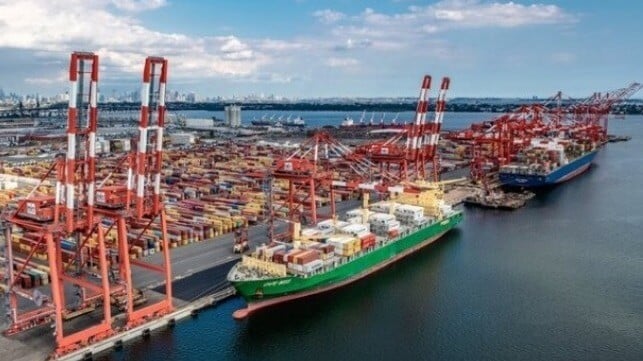USMX Files Unfair Labor Practice Charge Against ILA Ahead of US Port Strike

In possibly a final gambit to break the deadlock and get the negotiating process started, the U.S. Maritime Alliance (USMX) has filed a grievance against the International Longshoremen’s Association seeking to order them back to the negotiating table. Experts point out it is likely too late to head off the walkout now but almost assured at 36 ports on the U.S. East and Gulf Coast.
The association representing the dockworkers’ employers is seeking the help of the National Labor Relations Board to restart the talks. The employers have repeatedly said they are ready to negotiate but the ILA has refused formal negotiations since June.
“Due to the ILA’s repeated refusal to come to the table and bargain on a new Master Contract, USMX filed an Unfair Labor Practice charge,” the group reported in an announcement Thursday, September 26, just four days before the contract expiration. USMX requested “immediate injunctive relief – requiring the union to resume bargaining,” so a deal could be reached.
Under U.S. labor law, both sides are required to negotiate but as the rules point out not to reach an agreement. In a case such as the current deadlock, the NLRB will investigate and if they find either side is being “unfair” in the process they will seek remediation, in this case likely ordering a round of negotiations.
The ILA responded to the filing calling it a "publicity stunt," saying the employers who are not fairly compensating the dockworkers are the ones "engaging in a real 'unfair labor practice." Earlier in the week rejected the claims of no contact between the sides. In a statement, they asserted “The two sides have communicated multiple times in recent weeks. The stalemate remains in Master Contract negotiations because USMX continues to offer ILA longshore workers an unacceptable wage increase package.”
International President and Chief Negotiator Harold Daggett said, “They call me several times each week trying to get the ILA to accept a low-ball wage package.” The statement goes on to say the ILA “refutes USMX claims” that the wage demands exceed 75 percent for the six-year contract.
Associated Press is citing data from a 2019-2020 report from the Waterfront Commission that oversaw the Port of New York New Jersey which shows base pay of around $81,000 a year while noting with overtime and benefits it could exceed $200,000 annually. The Commission said a third of the NY/NJ longshore workers made $200,000 or more a year. CBS News however points out that West Coast port workers are now making more than $116,000 a year. Unconfirmed reports have said the ILA demands focus on creating parity and exceeding the 30 percent raise given on the West Coast in the 2023 contract.
The stakes are high with JP Morgan issuing an estimate that a strike would cost the U.S. economy as much as $5 billion a day. Everyone from the shipping lines to trade groups and maritime industry analysts also warns of widespread ramifications in the global supply chain. Sea-Intelligence has estimated that for each day of a strike, it would take four to six days to clear the backlog. They wrote that even a two-week strike could have ramifications into 2025.
The strike will impact 36 U.S. ports with a number set as high as 45,000 dockworkers set to walk the picket lines. It will impact nearly half of all containers moving through U.S. ports and include five of the 10 busiest ports in North America. The ILA in a statement yesterday pledged to handle all military cargo during the strike and to continue to work passenger cruise vessels.
“The Port of New York and New Jersey will be among those affected if the strike occurs,” notes Han Deng, transportation partner at the law firm Reed Smith. He cites data from the nonprofit research group Mitre saying the NY/NJ port “could see a daily loss of around $640 million.”
Dang notes, “A similar ILA strike in 1977 paralyzed ports for 44 days.” The ILA in its statements has insinuated it would picket ships if they attempted to divert to West Coast or other ports. The union said if it was ordered back to work by the federal government it would use tactics such as slowdowns and strict adherence to work rules to show its dissatisfaction.

that matters most
Get the latest maritime news delivered to your inbox daily.
Trade groups from the agricultural sector were the latest this week to call on the Biden administration to intervene. Earlier in the week a coalition of 177 trade groups appealed for intervention. So far, the White House has said it monitoring the situation but has not made a move to become directly involved. USMX reported it had outreach from the Department of Labor.
The major carriers as well as the ports and railroads are all announcing contingency plans and well into a winddown process ahead of the anticipated strike. The shipping lines have said they expect the ships to anchor and they will follow day by day on decisions. They are also looking at alternatives to reroute shipments but the expectations remain of widespread disruptions.
